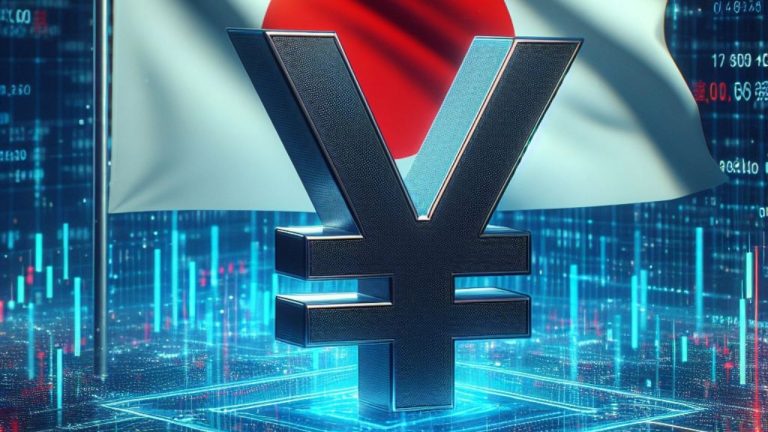 Hokkoku Bank, a regional financial institution in the Ishikawa prefecture, launched Tochika, Japan’s first deposit-backed stablecoin. Customers of the bank will be able to purchase the currency using Tochitsuka, an app developed by Digital Platformer, that previously allowed users to earn points from city services. Hokkoku Bank Reaches Milestone With Deposit-Backed Stablecoin Tochika Hokkoku Bank […]
Hokkoku Bank, a regional financial institution in the Ishikawa prefecture, launched Tochika, Japan’s first deposit-backed stablecoin. Customers of the bank will be able to purchase the currency using Tochitsuka, an app developed by Digital Platformer, that previously allowed users to earn points from city services. Hokkoku Bank Reaches Milestone With Deposit-Backed Stablecoin Tochika Hokkoku Bank […]
Japan’s official government pension fund is curious about Bitcoin (BTC) and crypto. On Tuesday, the Government Pension Investment Fund (GPIF) requested information from the public on illiquid assets that it hasn’t already invested in. The fund listed specific examples of potential investments that it is looking for info about, including forests, farmland, gold and crypto […]
The post $1,400,000,000,000 Pension Fund in Japan Exploring Diversification to Bitcoin and Gold appeared first on The Daily Hodl.

If newly proposed legislation passes, Japan will start allowing investment funds to hold digital assets. According to a new Bloomberg report, the administration of Japan’s Prime Minister Fumio Kishida is proposing revised legislation that lifts a restriction that prevents investment funds and venture capital firms from directly holding cryptocurrencies. Says the proposal, which was approved […]
The post Investment Funds Will Be Allowed To Hold Crypto Under New Legislation in Japan: Report appeared first on The Daily Hodl.

They have signed a memorandum of understanding on digital asset investment and semiconductor production.
Japan’s SBI Holdings financial services firm and Saudi Arabian state-owned oil company Saudi Aramco are considering teaming up on digital asset investment and semiconductor production projects. The sides signed a memorandum of understanding (MoU) on cooperation that includes the establishment of SBI Middle East in Riyadh as a base for operations in that region.
According to the MoU, signed Dec. 7, SBI and Saudi Aramco will consider collaborating in the field of digital assets and co-investing in their digital asset portfolios. They may identify Japanese digital asset startups that could be interested in expanding to Saudi Arabia and launch semiconductor production projects in both countries. In addition:
Saudi Aramco is the world’s second-largest corporation by revenue, after Walmart. The MoU mentioned Saudi Aramco investments aimed at complementing its supply chain. Cryptocurrency is “not recognized by legal entities” in Saudi Arabia, although the government has shown a healthy interest in Web3. SBI Holdings’ partnership with Taiwan-based Powerchip Semiconductor Manufacturing was also highlighted.

Payments platform Circle is collaborating with a Japanese financial giant as the nation gears up for a full-scale introduction of stablecoins. In a new press release, Circle says that it will be partnering up with SBI Holdings as a means of introducing its stablecoin USDC and other web3 services into the Japanese market after the […]
The post Circle Partners With Investment Giant SBI Holdings Amid ‘Full-Scale Introduction of Stablecoins’ to Japan appeared first on The Daily Hodl.
The number of tax evasion cases featuring crypto assets rose 35% in 2022.
According to Japan’s tax authorities, the average value of undeclared income in crypto fell by 19% in 2022.
On Nov. 24, the Japanese National Tax Agency (NTA) released its yearly summary of tax investigations. The 13-page document also contains data on the probe into crypto tax evasion.
Related: Circle and SBI Holdings partner to boost USDC circulation in Japan
The NTA initiated 615 investigations into citizens’ crypto holdings based on their tax declarations for 2022, up from 444 in 2021. In 548 cases, the agency found tax violations, a 35% increase over 2021, which had 405 crypto tax evasion cases.
However, the average value of undeclared crypto holdings dropped from 3,659 Japanese yen (around $245,000) in 2021 to 3,077 yen ($206,000) in 2022.
In the summer of 2023, Japanese regulators, including the NTA and the Financial Services Agency (FSA), confirmed that citizens would be spared from a capital gains tax on unrealized gains in crypto. That means they will not have to pay around 35% of taxes on those crypto assets stored without trade operations during the fiscal year.
This month, Japan joined a list of almost 50 nations that pledged to “swiftly transpose” the Crypto-Asset Reporting Framework (CARF), a new international standard on the automatic exchange of information between tax authorities, into their domestic law systems.
Magazine: This is your brain on crypto. Substance abuse grows among crypto traders

SC Ventures will establish a “Digital Asset Joint Venture” investment company in partnership with a Japanese financial conglomerate, SBI Holdings.
SC Ventures, the fintech investment arm of British bank Standard Chartered, will establish a “Digital Asset Joint Venture” investment company in the United Arab Emirates (UAE) in partnership with a Japanese financial conglomerate, SBI Holdings.
In the press release from Nov. 9, Alex Manson, the CEO of SC Ventures, revealed the new joint venture company’s goals:
“[...] to make strategic and minority investments in areas such as market infrastructure, risk management and compliance tools, DeFi, tokenization, consumer payments, and the metaverse.”
Manson highlighted the region’s new role as a hub for fintech due to its strengthening infrastructure and talent. However, the joint venture will not limit itself to the regional market but “explore the emerging digital asset ecosystem opportunities globally.”
Related: How high can Bitcoin price go by 2024?
In May 2023, Standard Chartered signed a memorandum of understanding with the Dubai International Financial Centre (DIFC), granting the bank approval to launch digital asset custody services for its institutional clients worldwide.
Last month, another joint venture by Standard Chartered and SBI Holdings — institutional cryptocurrency custody platform Zodia — launched its services in Hong Kong. Established in 2021, the platform supports 38 cryptocurrencies and has recently opened services in Japan, Singapore and Australia.
Diving deep into the crypto custody business, Standard Chartered has not been neglecting the other side of the digital economy. In June, the bank teamed up with PricewaterhouseCoopers China to produce a white paper on applications for central bank digital currency in the so-called Greater Bay Area of China, which includes Guangdong province, Hong Kong and Macao.
Magazine: Deposit risk: What do crypto exchanges really do with your money?

Progmat Coin hopes to issue yen- and dollar-pegged “trust-type” stablecoins next summer to accommodate around-the-clock settlement.
The Progmat Coin ecosystem is taking shape in Japan. With a market maker, wallet provider and cryptocurrency exchanges on board, Progmat and Mitsubishi UFJ Financial Group (MUFG) hope to launch two stablecoins in the summer of 2024.
Stablecoin platform Progmat Coin, MUFG and wallet provider Ginco have begun a study with the goal of issuing a yen-denominated XJPY stablecoin and dollar-denominated XUSD stablecoin, Progmat said in a statement. This is in addition to the platform's function enabling stablecoin issuance.
#japan #stablecoin #crypto #payments@ginco_inc, Mitsubishi UFJ Trust and Banking, and #Progmat are starting a joint study to introduce an “infrastructure stablecoin” with the aim of improving the settlement efficiencies among the players in the crypto asset market by leveraging… pic.twitter.com/Ei3I7t2bVb
— Norbert Gehrke (@norbertgehrke) November 7, 2023
Liquidity provider Cumberland and crypto exchanges Bitbank and Mercoin also figure into the Progmat plans, and other crypto asset-related businesses are invited to join. Binance Japan announced in September that it was conducting a joint study with MUFG on the issuance of stablecoins pegged to various currencies.
Related: Japan to allow startups to raise funds by issuing crypto instead of stocks: Report
The XJPY and XUSD stablecoins will beintended to improve the efficiency of settlements between crypto asset exchanges, with XUSD for use in cross-border settlements. Japanese crypto exchanges use banks for settlement, according to the Tokyo Fin Tech blog, causing delays that the Progmat system will eliminate.
MUFG introduced the Progmat platform in February 2022 in a consortium with other large Japanese banks. It is regulated under the revised Payment Services Act that came into effect in June 2023. The revised act provides for three types of stablecoin. Progmat would support the “trust” type coin, issued by trust banks.

MUFG said in June that Progmat would be used for banks to issue stablecoins on Ethereum, Polygon, Avalanche and Cosmos. Only banks are allowed to issue stablecoins under Japanese law, and stablecoins on Progmat will be required to undergo licensing ahead of launch.
Progmat Coin is not working in a vacuum. Blockchain startup Soramitsu is exploring a new stablecoin exchange for cross-border payments to Asian countries using Camboodia’s central bank digital currency as well as stablecoin. Tokyo-based startup G.U. Technologies is also reportedly creating a stablecoin platform.
Magazine: Why Animism Gives Japanese Characters a NiFTy Head Start on the Blockchain